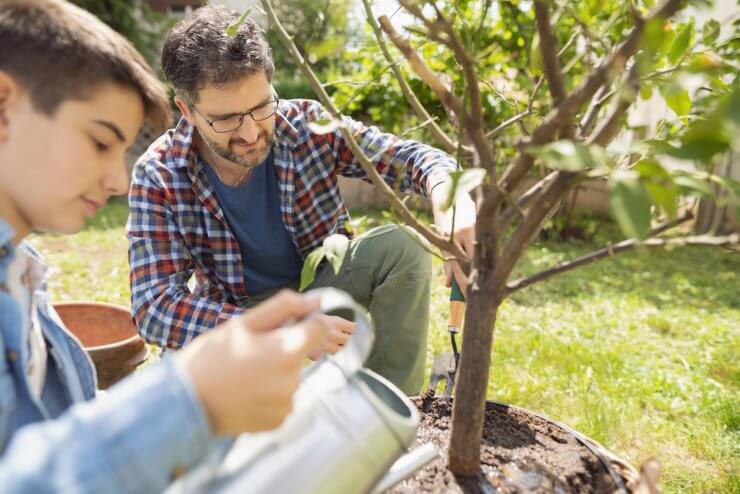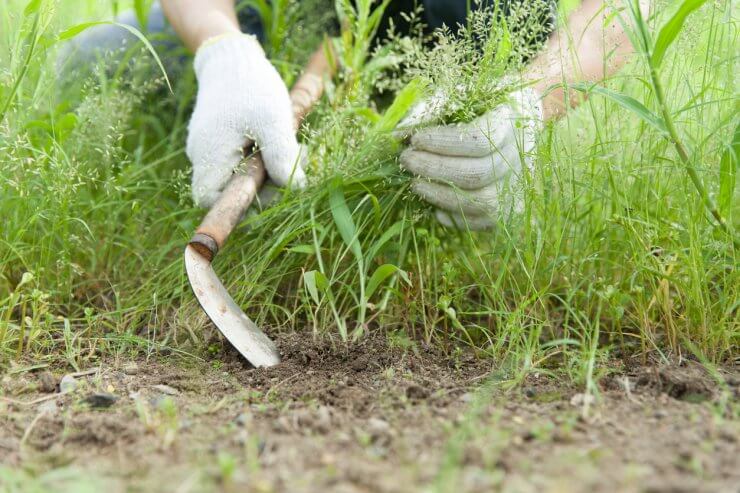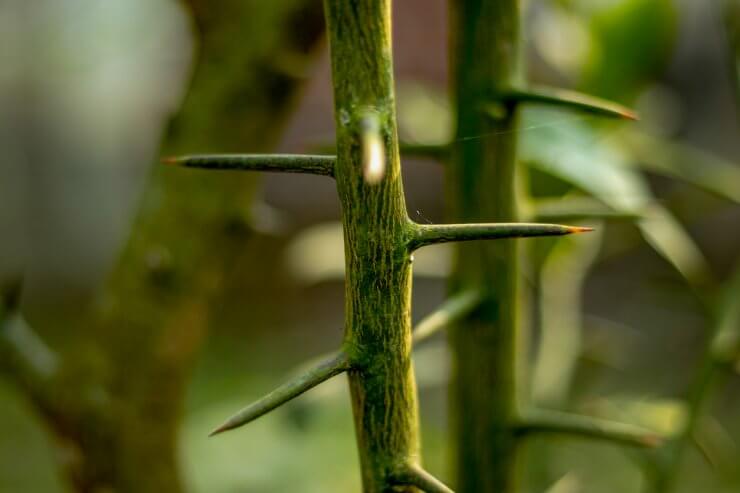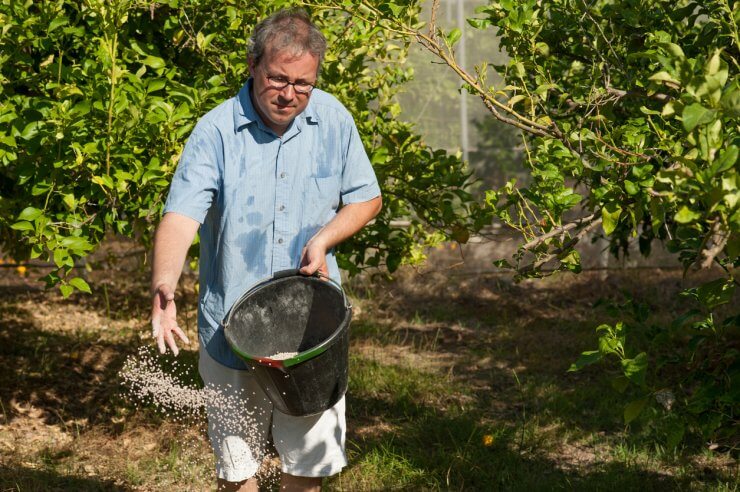
Father and son watering lemon tree
Water
Once your lemon trees are settled in—whether it’s in a container, a raised bed, or open ground—consistency is key when it comes to watering. Lemon trees like a long drink of water once in a while. How long a while is depends on your environment and your soil. Lemon trees like soil that’s moist, but not soggy.
In general, you’ll want to water deeply about once a week; again, it depends on your specific environment. Arizona and North Carolina have radically different climates. If the top of the soil is a little dry, that’s OK. But don’t let the soil dry out. This is especially important when you’re tending trees growing in containers—it’s not like they can stretch their roots out in search of more water.
For trees in the ground, a long deep watering is the way to go. To ensure that the tree roots get the thorough watering they need, you can create a watering basin around the drip line of the tree—that’s the perimeter of the canopy where rain would drip off the leaves. Expand your watering basin as the drip line expands.
It’s best to water in the morning, so your tree can soak up that deep drink of water and put it to work growing lemons. Of course, if you fall behind in your watering and notice your tree is in serious need of a deep drink, don’t wait until morning. Go get the hose.
Mulch is helpful to help conserve water and deter weeds. Keep all mulch at least 6 inches away from the base of the trunk to avoid root diseases. You can lay down a 2- to 3-inch layer of wood mulch or compost to help with water retention. Light colored gravel or crushed rock can help reflect heat and help speed up the ripening of your lemons. You can also consider using “living mulch”—nitrogen-fixing clover planted between trees can provide a ready source of nitrogen for your trees while attracting pollinators.
Weeding

Removing weeds
When it comes to weeding around your lemon trees, early and often is best. If you’ve used weed-free soil and well-rotted organic matter, and laid down mulch, you shouldn’t have a big weed problem.
Properly preparing your soil is an excellent preventive measure against the emergence of weeds. When you till or cultivate the area where you’ll plant your lemon tree, remove weeds and debris. You’ll likely find that the first few weeks after planting are the only time you’ll be pulling up weeds around your tree.
If weeds spring up around your lemon trees during the growing season, work the soil around the base of the plants with a hoe—only deep enough to kill the weeds and not damage the plant’s roots.
Suckers & Thorns

Thorns on a young lemon tree
Most lemon trees are grafted onto rootstock. It’s important to know where that graft spot is. The fruiting wood is above; the rootstock is below. Frequently, the rootstock will send up suckers. You need to nip these in the bud, so to speak. Left unchecked, they will overtake your growing lemon tree and suck the life out of it. Suckers are especially common on young trees. Be vigilant, and cut those suckers off as soon as you find them.
Young lemon trees will sometimes have thorns; this is nature’s way of protecting the tree from grazing animals. As your tree gets older, the thorns will not show up as often. Prune thorns as you like.
Fertilizer

A man fertilizing his citrus trees
Lemon trees are heavy feeders, and they appreciate a hearty helping of fertilizer periodically; how much and how often depends on the age of your tree. Get a fertilizer specially formulated for citrus trees. Be sure to follow the mixing instructions. As your tree gets older, it will require less frequent fertilization. In general, trees that are just a year old will need fertilizer every couple of months. By the time a tree is 5 years old or older, three feedings a year will be sufficient.
How often do you have to fertilize or water your lemon trees? Do you have any particular challenges growing lemon trees? Please tell us your tips for nurturing healthy lemon trees.


 Previous
Previous


You can download which video you like and share also to your friends or colleague…
https://statusraja.in/motivational-whatsapp-status-video-download/
I have a two lemon saplings, about 7 feet tall. One is picking up in its leaf growth since I’ve been removing any flowers trying to grow, however they still are fairly sparse of leaves. They’re in large pots in close to full sun and I just ordered citrus tree fertilizer to use.
With that said, my question is, should I remove branches that aren’t bearing any leaves to encourage growth of leaves on ones that are? Any other recommendations for these trees would be helpful too!
Thanks in advance!
It’s very informative blog for us. Thanks for sharing with us.
http://www.brevardtreecompany.com
I have a 40+ year old lemon tree my grandfather planted when I was a child at my dad’s house. Any tips for care for “elder” trees?
Laura – You are so lucky to have a legacy tree in the family. Well maintained lemon trees typically live for 50 years or more, so hopefully you have lots more harvests to look forward to.
The best thing you can do to ensure its health is to be vigilant about pest and disease prevention by regularly inspecting the branches, leaves and fruit. And make sure to keep the area surrounding the tree clean and tidy – removing weeds, debris and fallen fruit to minimize the opportunity for pests and diseases to take hold.
Annual pruning after harvesting will also help to keep this mature tree healthy. It allows sunlight to reach all of the branches and is a good way to remove damaged or weakened branches.
Good luck and many happy returns!